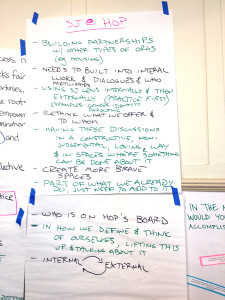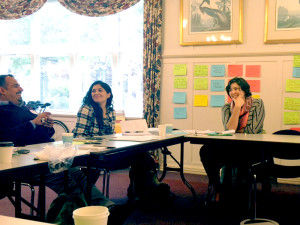 HOP is deeply committed to ensuring access to health and social services. According to one of HOP’s board members, “Health equity is the number one reason why we are doing this work… why we are all here.” [1] We understand that it is impossible to achieve health equity without a just and equitable society. Our commitment to social justice and health equity (SJHE) recognizes that health and well-being is affected by a host of factors, including where people live, work, and spend time. As a result, one of our central strategies is to promote SJHE to those serving underserved and vulnerable communities.
HOP is deeply committed to ensuring access to health and social services. According to one of HOP’s board members, “Health equity is the number one reason why we are doing this work… why we are all here.” [1] We understand that it is impossible to achieve health equity without a just and equitable society. Our commitment to social justice and health equity (SJHE) recognizes that health and well-being is affected by a host of factors, including where people live, work, and spend time. As a result, one of our central strategies is to promote SJHE to those serving underserved and vulnerable communities.
We are continually exploring the role of SJHE in our work in various ways. In 2014, a SJHE workgroup was formed to delve into the relationship between social justice, health equity, and HOP’s work. In 2015, it was included as a key theme in our Strategic Plan. In 2016, the SJHE workgroup hosted an all-staff, full-day retreat facilitated by Human Impact Partners to examine and expand the way SJHE influences our work with clients as well as explore how it could further shape our organizational culture and norms.
This retreat was a valuable opportunity for HOP staff to come together and discuss what SJHE meant to them and their work at HOP. We had many candid and thoughtful conversations, and staff provided input on how HOP could further incorporate SJHE in our work. As a result of the day-long retreat, HOP identified several actionable steps that included:
- Define Social Justice for HOP;

- Create three work groups to discuss spaces for SJHE discussions, considerations when assigning projects, and awareness of SJHE in future decision making;
- Provide additional opportunities for staff and board to attend trainings or conferences related to SJHE; and
- Integrate SJHE into current and future work plans.
We are excited to share the two definitions of social justice that HOP has adopted from the UC Berkeley Social Justice Symposium and “The Nature of Social Injustice and its Impact on Public Health,” Social Injustice and Public Health:
- “Social Justice is a process, not an outcome, which (1) seeks fair (re)distribution of resources, opportunities, and responsibilities; (2) challenges the roots of oppression and injustice; (3) empowers all people to exercise self-determination and realize their full potential; (4) and builds social solidarity and community capacity for collaborative action.”[2]
- “Social justice embodies the vision of a society that is equitable and in which all members are physically and psychologically safe.”[3]
What does social justice and health equity mean to you? Comment below!
[1] From HOP’s 2014 Marketing and Branding Report
[2] From the UC Berkeley Social Justice Symposium. http://socialwelfare.berkeley.edu/social-justice-symposium-about
[3] From: Barry S. Levy and Victor Sidel. The nature of social injustice and its impact on public health, p.8. In: Social Injustice and Public Health, Barry S. Levy and Victor Sidel, editors. Oxford Press, 2006, 529 pp.http://www.nonviolenceandsocialjustice.org/FAQs/What-is-Social-Justice/43/
